The Transition Is Just Beginning
Adelina Marini, June 20, 2013
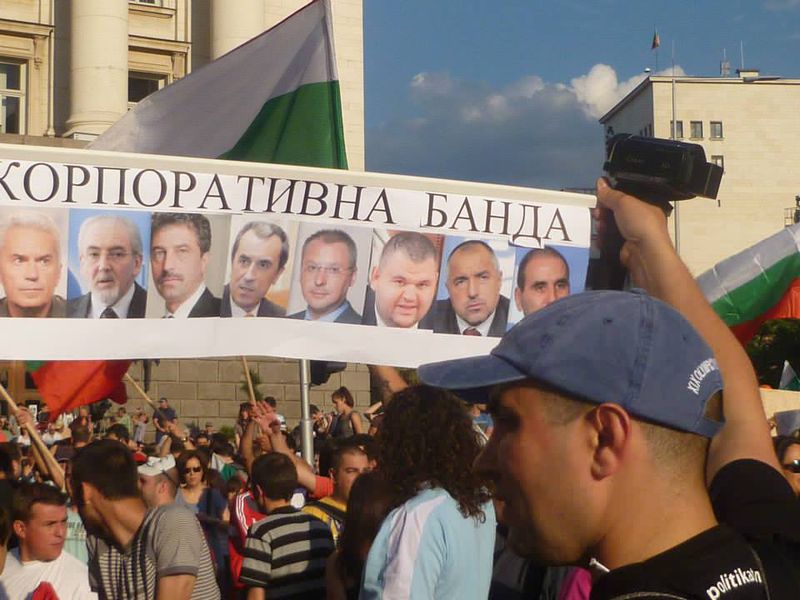 When the EU created a precedent by adopting an unprepared member state, no one in the other EU capitals nor in the European institutions had any idea where exactly the problem was. It was assumed that Bulgaria was almost entirely done with the transition from totalitarian rule in politics and economy toward democracy and market economy and that it needed just a small push to complete the reforms. That is why an exception was made through the establishment of a special mechanism to play the role of a pre-accession stick with the aim to keep the "momentum", as the Commission used to call it. The mechanism has been functioning for a sixth year in a row and the main reason for the lack of progress and results is that it is aimed only at the symptoms and not at the core reasons. Against the core reasons revolted tens of thousands of Bulgarians who, since last Friday, have not missed a day to gather in front of the government buildings and also in front of some party headquarters to protests against the substitution of democracy with pure oligarchy.
When the EU created a precedent by adopting an unprepared member state, no one in the other EU capitals nor in the European institutions had any idea where exactly the problem was. It was assumed that Bulgaria was almost entirely done with the transition from totalitarian rule in politics and economy toward democracy and market economy and that it needed just a small push to complete the reforms. That is why an exception was made through the establishment of a special mechanism to play the role of a pre-accession stick with the aim to keep the "momentum", as the Commission used to call it. The mechanism has been functioning for a sixth year in a row and the main reason for the lack of progress and results is that it is aimed only at the symptoms and not at the core reasons. Against the core reasons revolted tens of thousands of Bulgarians who, since last Friday, have not missed a day to gather in front of the government buildings and also in front of some party headquarters to protests against the substitution of democracy with pure oligarchy.
And the reasons are that yet in the very beginning of the transition the link with the past had not been entirely broken. The old security services were not unmanned and put into the museums. High ranking officers of theirs began building the democratic facade, the economy, the media, the institutions and to prepare the soil for the creation of a party corporation - this is a corporation of several parties which in fact have a single centre of command. I realise that this is really hard to understand, especially by people who were not born or have not lived sufficiently long in Bulgaria. I myself, who is born, raised and spent a large part of my life in Bulgaria found it hard to accept this. I often got irritated by the permanent conspiracy theories and by the ideas about some secret plots. However, the reality from the past 4 years reveals more and more the scale of the substitution.
That is why the task of the protesters is extremely tough - they have to fight a huge octopus which is resolved to maintain its influence. Already quite many years ago, a former general from the intelligence services admitted very publicly that around the world states have mafias, while in Bulgaria the mafia has a state. May be, back then it was clear for the people who had information at their disposal that was left hidden from the public, but now the masks have began falling and the cards are on the table. The protesters are those Bulgarians who remained unseen by the European public in the past years when it was talked about Bulgarian Roma people tormenting France and the Scandinavian countries, when it was talked about organised crime and corruption, scary immigration, etc. All that time these Bulgarians, who at the time of writing of this article were gathering at the square for another day of protests, dreamt of living in the same way as the people in the unencumbered by communism, totalitarianism and oligarchy countries.
They want rules, they want these rules to be valid for everyone, they want those who erred to be put on trial and imprisoned, they want transparent governance, accountable politicians, they want future for their children, they want genuine political parties, not party corporations, they want the elections not to be manipulated, bought or substituted. All this cannot be delivered by the current political class. At the moment, Bulgaria for the first time has an oppositionless parliament. A parliament consisting of accomplices. Some say that this is the protest of the non-represented, but this is not true. Among protesters there are many people who supported some of the parliamentary parties. They supported them because they believed in the values that were presented to them. Now they feel betrayed. And even more discouraging is that now, when the democratic mechanisms are most desired, they do not work - like resignation, dismantling the failed members of party responsibilities. Something that the Commission told Romania quite directly.
Protesters are deeply aware and are blamed for this that they are facing the risk of causing new elections that could be won by another branch of the party corporation which is constantly vomiting new and new political figureheads, raised up by the media monopoly. They are completely aware that their battle needs to be fought at several fronts. And here is the place to get back to the mechanism.
Operation 'catharsis'
Many of the failed politicians, in their attempts to remain in power, are using words like "apology", "forgiveness" and even "catharsis" without, however, investing any content in them. They behave as a failed, alcoholised husband whose wife had finally dared asking for a divorce. And he is making desperate attempts to keep her, to tell her how much he loves her, how much he is sorry and how he is a different man already. But protesters do not believe in tears and want a real catharsis - political, social, 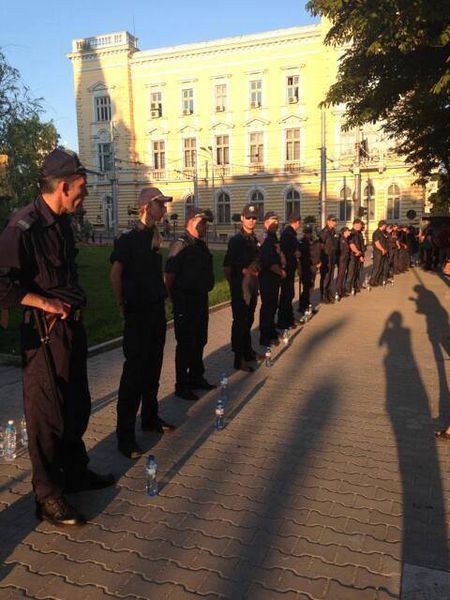 media catharsis. This seems a pretty complex task, but, in fact, it is about the beginning of a new and this time, let's hope, a genuine transition to genuine democracy and genuine economy.
media catharsis. This seems a pretty complex task, but, in fact, it is about the beginning of a new and this time, let's hope, a genuine transition to genuine democracy and genuine economy.
Such a catharsis can be achieved through recreation of the European Commission Mechanism at civil level and its expansion to cover as much as possible the space that needs recovery. There should be a civil Reforms Verification Mechanism because the Commission can only consult, instruct, fingerpoint, but it cannot do anything more than that. It cannot take governments down, it cannot appoint prime ministers, ministers, nor can it write laws or rules. This can be done by the citizens in one way or another. It is obvious that even if the government of Oresharski fell another one will come after it, then a second, a third or fourth. However, all of them will work under the same rules.
So, let's recall which are the six benchmarks the European Commission has been monitoring for six years now, desperately:
1. Adopt Constitutional amendments removing any ambiguity regarding the independence and accountability of the judicial system;
2. Ensure a more transparent and efficient judicial process by adopting and implementing a new judicial system act and the new civil procedure code. Report on the impact of these new laws and of the penal and administrative procedure codes, notably on the pre-trial phase;
3. Continue the reform of the judiciary in order to enhance professionalism, accountability and efficiency. Evaluate the impact of this reform and publish the results annually;
4. Conduct and report on professional, non-partisan investigations into allegations of high-level corruption. Report on internal inspections of public institutions and on the publication of assets of high-level officials;
5. Take further measures to prevent and fight corruption, in particular at the borders and within local government;
6. Implement a strategy to fight organised crime, focusing on serious crime, money laundering as well as on the systematic confiscation of assets of criminals. Report on new and ongoing investigations, indictments and convictions in these areas.
These benchmarks continue to be completely relevant, it is only that the Commission is doing a post-monitoring, while the civil monitoring should actually be an active involvement in the content and verification of implementation.
A pure media environment
A benchmark number one should be the media environment. Bulgaria's biggest problem, as this website alarmed many times, is the complete monopolisation of the media environment by only one owner with unclear origin of capital. The media of the known as "the media corporation" group do not stick to any journalistic and ethic rules, they have their own agenda and follow it with determination. Be it by building a new political player or destroying an influential political object, presenting a sponsored (to put it mildly) protest as a completely democratic event and vice versa - vitiating a spontaneous protest by presenting it as a gang of robbers. The media corporation owns TV outlets, newspapers, many websites, but it also holds rights for digital distribution.
euinside proposed several months ago the problems with media environment to be included in the Mechanism and still believes that this is the only way to ensure a genuine, not imitated pluralism through complete transparency of ownership and capital. Media monopolies should not be allowed, but if this is the case, as is in Bulgaria, they should be destroyed. The social networks and Internet are still not an alternative to mainstream media whom many voters are dependent on as sources of information.
A moral constitution
Another large-scale problem in Bulgaria is the lack of understanding what morals actually are? In the past years, many times it was talked about "new morals in politics" in the country, but it is obvious that there is a huge gap between the morals of the thousands of protesters since Friday in Sofia and those who promised new morals. That is why, a very detailed moral constitution should be written so that all the perceptions of values are standardised and on that basis the building of the state will continue. It should be clearly formulated what exactly does corruption mean, what theft means, what is adjusting of public tenders, what resignation is and what is the meaning of resigning, what is responsibility and how 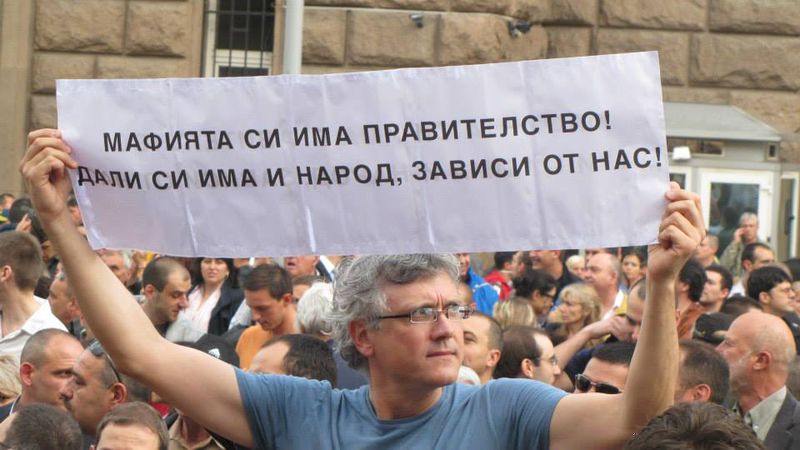 should it be manifested. In the past decades, there were many statements by politicians that they take political responsibility, but this is not demonstrated in any other way but talking.
should it be manifested. In the past decades, there were many statements by politicians that they take political responsibility, but this is not demonstrated in any other way but talking.
All future MPs, MEPs (because they will represent Bulgaria in the EU), all high officials, media and journalists should take an oath in that moral constitution. If values do not have a common denominator, the tensions in society will only expand. That is why, initially, the protest was defined as "a protest of values".
Probably there will not be a few to object using the word "constitution", but I insist on it because we have to look ourselves in the mirror. Judging by the number of lady birds (in Bulgarian the word is kalinka as was the name of several women with false diplomas), the revealed statistics of bought drivers' licences, the falls insurances "civil responsibility" and all the other "small violations, it becomes clear that we need precisely a constitution that will be valid for all of us. We cannot trust only in the family education, as it becomes clear. The moral rules and values have to be taught at school if we want to clean our country from the irresponsibility, carelessness, the dodginess, personal benefiting on the back of others.
Currently, we have a golden chance to do something different and new. We do not need to imitate someone else's foreign democracy. We need to face our problems and say "enough"! True, for sure it will continue to be tempting to pay a twenty to the traffic police instead of allowing being punished, but let us try not to do that. Let us try and be more understanding to each other and to put ourselves in others' boots and not to imagine that we are more important than others which is why our tiny little violation is forgivable. It stops being our little secret violation the minute when hundreds of people begin to practise it daily.
Cleansing the parties
Among the protesters in the past days, there are many young, energetic, but disappointed and betrayed members of some of the party mastodons. The parties cannot be viewed as private companies and to believe that peeking into their party works requires discretion. First, many of the parties, even outside parliament, receive state subsides. This means that this is taxpayers' money. Second, no matter if they act only in their ideological field they, too, are as responsible for the future of society, as all the other political parties. That is why, it is necessary the cleansing of parties from close to the oligarchy and the former security services members to be subject of enhanced civil control.
No matter what ideological views we might have, we need a political balance. We need both left and right. We also need the liberals with their more open and balancing stances. What we do not need is party swarming aimed at scattering the voters. We have already lived through that and so it goes nowhere. Also not needed are the leaders' parties because they do not represent anyone but their leaders. The parties need to be accountable and what happens inside does not affect only their members and leadership. It also affects us, who expect to be represented in Parliament or the municipal councils.
Bulgaria is not Sofia
 Another very critical for the stability and success of the new transition problem is the feudalisation of the countryside. Through the years of the mimicric transition many areas of the country have been brain and rules drained. This has opened the path for accommodation of pure feudalism in the heart of the EU in the 21st century. The goals of the new transition should be "exported" in the countryside, too, so that they can root in there as well. Because, even if the most modern, innovative and perfect electoral code were to be written, the people in some areas in the country vote under threat of losing their jobs, for money because they are out of work or for other reasons. The party corporation will not disappear in one night, as we dream, it will try and adapt to the new realities and will begin taking advantage of them.
Another very critical for the stability and success of the new transition problem is the feudalisation of the countryside. Through the years of the mimicric transition many areas of the country have been brain and rules drained. This has opened the path for accommodation of pure feudalism in the heart of the EU in the 21st century. The goals of the new transition should be "exported" in the countryside, too, so that they can root in there as well. Because, even if the most modern, innovative and perfect electoral code were to be written, the people in some areas in the country vote under threat of losing their jobs, for money because they are out of work or for other reasons. The party corporation will not disappear in one night, as we dream, it will try and adapt to the new realities and will begin taking advantage of them.
That is why it is necessary to have a benchmark about the democratisation of the feudalised communities. These people should have access to Internet, free media (regional, national), they should be told daily and hourly that their fate is in their own hands and does not depend on the will of the local feudal lord. Here a big role have the other benchmarks, especially the media one and the one that deals with the judiciary.
Demonopolisation
Monopolies are, indeed, a grandiose problem and they should be broken up to ensure as open and fair as possible market, transparent formation of prices and diversification of suppliers. A special focus of the monitoring of this benchmark should be on energy which is a source of a large part of the country's problems.
Now or never
The Commission should not be isolated from this entire process of cleansing. The leaders of the member states should give a mandate to the Commission to expand the scope of monitoring under the CVM, thus supporting the efforts for democratisation of the poorest EU member state. Instead of continuing to be marginalised and at the negotiating table in Brussels the next oligarchic prime minister to be looked at with ridicule and boredom, the EU can recover its function of a democratiser of its periphery. The aspiration of the countries from the Western Balkans and in general the former 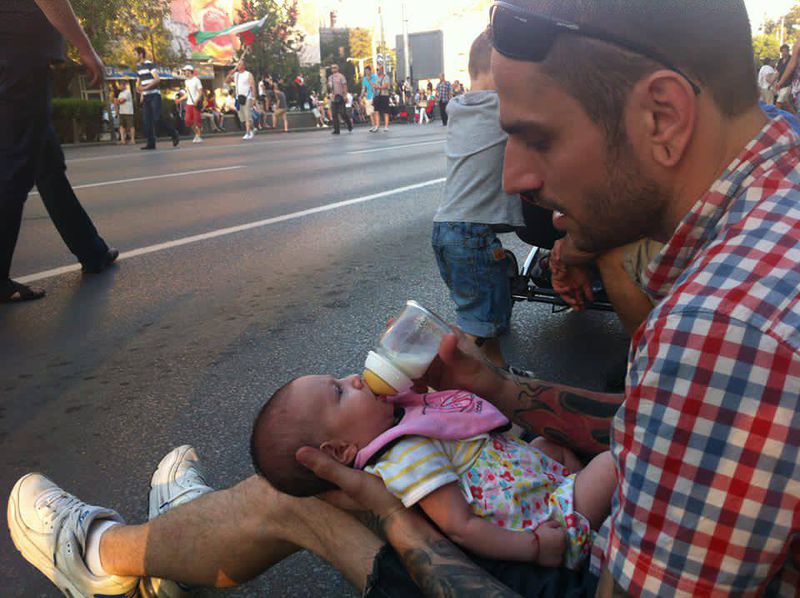 communist countries for EU and NATO membership has been an incredible driver of change. Even now, in spite of the crisis and the enlargement fatigue, the countries in the region believe their future is in the EU.
communist countries for EU and NATO membership has been an incredible driver of change. Even now, in spite of the crisis and the enlargement fatigue, the countries in the region believe their future is in the EU.
The European integration will end when all profess the European values in the same way, believe in them and they are their guiding star. Anything less will be just a tower of cards that will collapse with every bigger crisis. The eurocrisis is only a vague illustration of this. The oligarchy, the failed states and the mafia have no place in the EU and in the governance of its member states. They must be dealt with once and for all. Only then we will be in a position to say that we, indeed, are free and that the transition has finished. In the winter, I wrote that Bulgaria needed a political troika because I believed that changes from the inside were impossible. Now I believe they are possible.
 Entrance to the Berlaymont building | © EC - Audiovisual Service
Entrance to the Berlaymont building | © EC - Audiovisual Service | © European Union 2020, EC - Audiovisual Service
| © European Union 2020, EC - Audiovisual Service Commission President Ursula von der Leyen | © European Union 2019 - Source: EP
Commission President Ursula von der Leyen | © European Union 2019 - Source: EP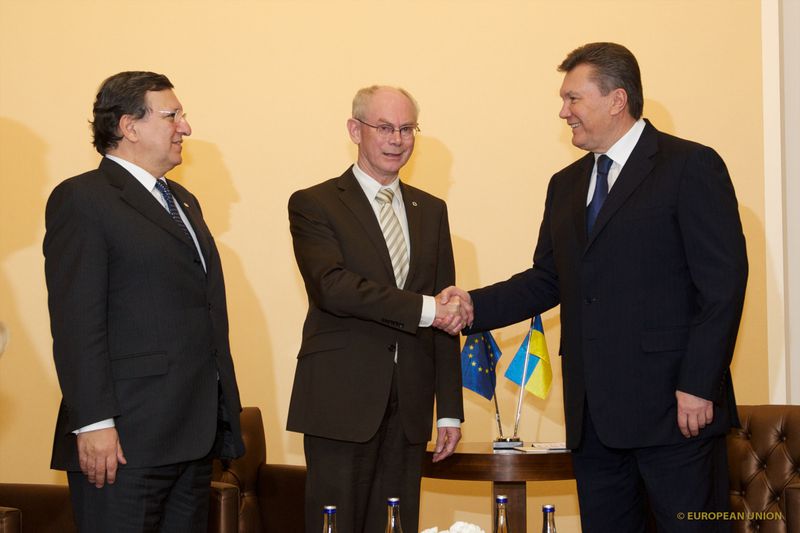 Jose Manuel Barroso, Herman Van Rompuy, Viktor Yanukovych | © Council of the EU
Jose Manuel Barroso, Herman Van Rompuy, Viktor Yanukovych | © Council of the EU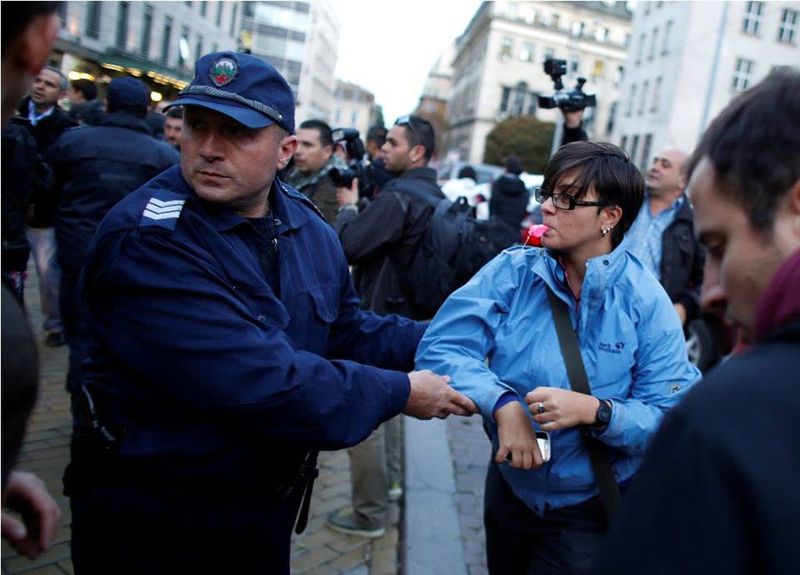 Magdalina Guenova | © Magdalina Guenova
Magdalina Guenova | © Magdalina Guenova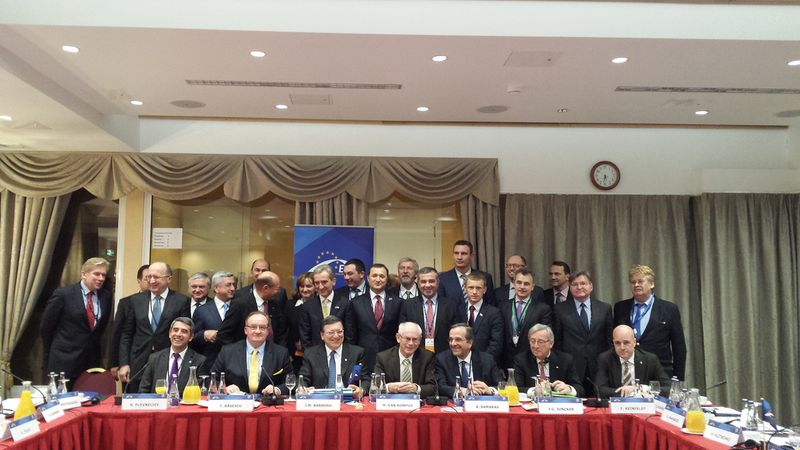 | © EPP
| © EPP